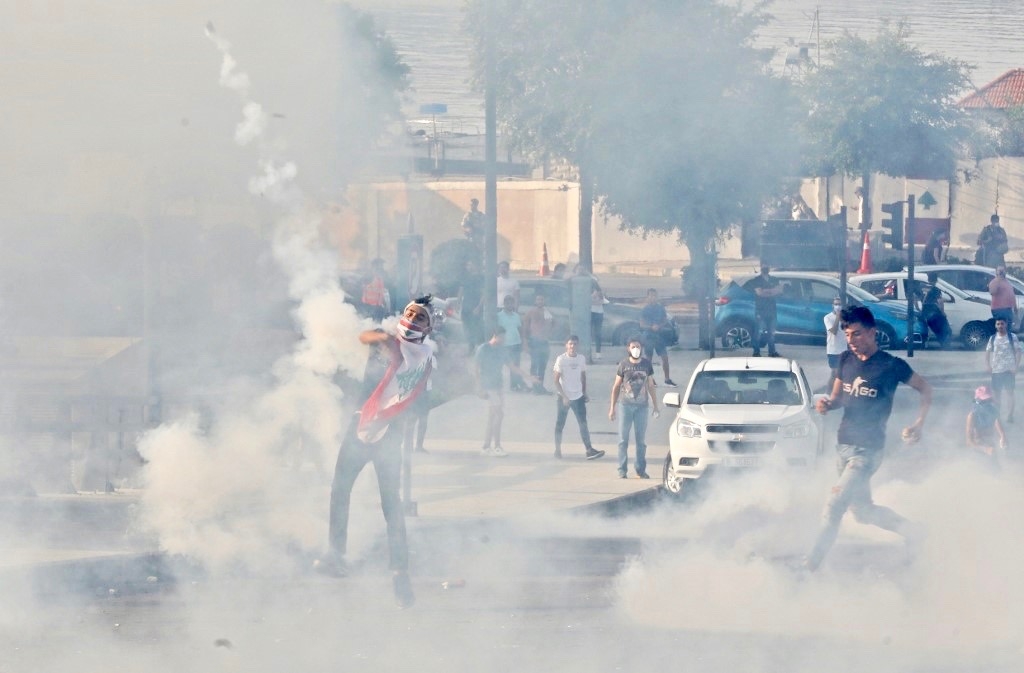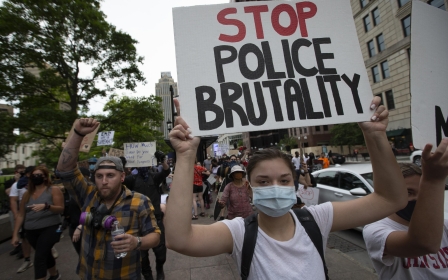Lebanon: Dozens wounded in Beirut clashes over failed economy, Hezbollah

Protesters poured into the streets of the Lebanese capital on Saturday to decry the collapse of the economy, as clashes erupted between supporters and opponents of the Iran-backed Shia group Hezbollah.
More than 35 percent of Lebanese are unemployed, while poverty has soared to 45 percent of the population, according to official estimates. Lebanon is also one of the world's most indebted countries and defaulted on its external borrowing for the first time in March, according to AFP.
The first big protests since the government rolled back coronavirus lockdown measures in mid-March come as Beirut negotiates an International Monetary Fund (IMF) package it hopes will secure billions of dollars in financing to prop up its collapsing economy, Reuters said.
Hundreds filled the streets around Martyrs Square in the centre of Beirut, with skirmishes also between protesters and security forces, who fired tear gas. Forty-eight were wounded in the violence and 11 were hospitalised, the Lebanese Red Cross said.
"We came to the streets to demand our rights, call for medical care, education, jobs and the basic rights that human beings need to stay alive," said 21-year-old student Christina.
Many protesters wore face masks as part of hygiene measures imposed to fight the pandemic, which has severely exacerbated an economic crisis, the worst since the debt-burdened country's 1975-1990 civil war.
Still, Saturday's protest turned violent as supporters of Hezbollah clashed with some demonstrators who were demanding that the group disarm.
Hezbollah is the only group to have kept its weapons since the end of the Lebanese civil war, deeply dividing Lebanon along political lines.
"No to Hezbollah, no to its weapons," said a sign held up by Sana, a female protester from Nabatiyeh, a city in southern Lebanon, a Hezbollah stronghold. "Weapons should be only in the hands of the army," said the 57-year-old.
"As long as there are militias that are stronger than the state, then the government will not be able to fight corruption," said John Moukarzel, a real estate company owner.
Supporters and opponents of Hebzollah threw stones at each other, prompting the army to intervene by forming a human chain to separate them, an AFP photographer said.
Supporters of Hezbollah, which is also represented in the government and parliament, chanted: "Shia, Shia."
Security forces fired tear gas near a street leading into the parliament building behind Martyrs Square, after some demonstrators pelted them with stones and ransacked shops in the area.
Political crises
Some protesters set fire to garbage bins as anti-riot police advanced towards them.
Lebanon has been rocked by a series of political crises in recent years, before the economic crunch helped trigger unprecedented cross-sectarian mass protests in October.
The demonstrations forced the government to resign and a new one headed by Prime Minister Hassan Diab was approved by parliament in February, tasked with launching reforms and combatting corruption.
Many Lebanese, however, say the new administration has failed to find solutions to the country's manifold problems, including a grinding recession and spiralling inflation.
The local currency has lost more than half of its value on the black market in recent months, falling from the official rate of 1,507 to more than 4,000 pounds to the dollar. Banks have gradually stopped all dollar withdrawals.
A sign held aloft by protesters on Saturday called for "a government that eliminates corruption, not one that protects corruption".
Diab's government adopted an economic recovery plan in April and has begun negotiations with the IMF in a bid to unlock billions of dollars in potential aid.
Middle East Eye delivers independent and unrivalled coverage and analysis of the Middle East, North Africa and beyond. To learn more about republishing this content and the associated fees, please fill out this form. More about MEE can be found here.





